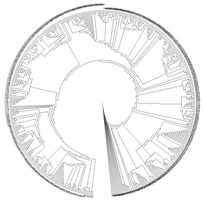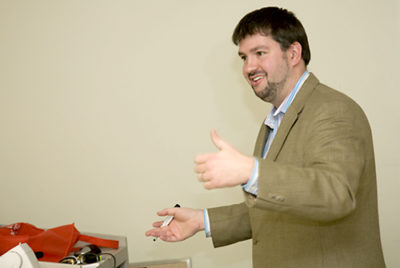Wyckoff lab works to trace the ingredients in our ‘genetic soup’
“It has long been an axiom of mine that the little things are infinitely the most important.”
-Sherlock Holmes; The Adventures of Sherlock Holmes
As a scientist and educator who spends a great deal of time observing the world through the lens of a microscope, Gerald Wyckoff would not argue with that statement. And like Sir Arthur Conan Doyle’s fictional detective, Wyckoff is trying to unravel a mystery — but not just any mystery. Wyckoff is looking for clues to solve what is perhaps the ultimate “whodunit.”

Click here for larger view.
From the SPEED database: This circular diagram is an example of a phylogenetic, or evolutionary, tree. This example represents the evolution of a specific element, known as Zinc-finger domains, an element present in a large number of proteins that help control biological processes. Currently, the SPEED database houses information from diverse species, including humans, chimpanzees, mice, rabbits, and marsupials.
“Put simply, I’m interested in what makes humans human,” said Wyckoff, who is an associate professor of molecular biology and biochemistry at the UMKC School of Biological Sciences. “My dream is to be able to demonstrate the complete evolutionary path of how we, as a species, became the people we are today.”
Wyckoff began dreaming about science when he was just a child, growing up in Commack, NY, about an hour outside New York City. He knew at a young age that he wanted to be a biologist and jokes that he probably spent more time walking through museums than he did running around playgrounds.
While he was still in high school, he cemented his interest in biology by taking courses at New York’s renowned Cold Spring Harbor Labs on Long Island. After completing his undergraduate degree at Cornell in 1994, he moved on to the University of Chicago to pursue his postgraduate work. It was there that he began to focus on the genetic side of biology.
“I became particularly interested in identifying the often surprisingly small genetic differences that distinguish one species of animal from another and the even smaller differences between individual human beings,” Wyckoff said. “All of the differences between you and I, for example, can be traced to changes in just a relative handful of nucleotides, the tiny molecules that make up our DNA.”
Knowing that those changes are there is one thing — finding them, however, is another, he noted.
“In the 1980s, it was thought that these ‘meat and potato’ changes in the genetic soup were there, but we just hadn’t found them yet,” he said. “By the 1990s, however, we began to think that we must be missing something. Thanks to advances in computer technology and the development of more sophisticated filtering techniques, we discovered that the genetic information is spread throughout the soup, rather than concentrated in big chunks.”
What Wyckoff finds even more interesting, however, are not those tiny changes that explain our individual differences, but the genetic changes that occurred over time that define who we are as a species. And those changes are even harder to find.
“Those changes, or mutations, provide an evolutionary timeline for analyzing the past, and perhaps the future, progression of our species,” Wyckoff said.
Up to SPEED
While at the University of Chicago in the late 1990s, Wyckoff began to focus his efforts on developing the mechanisms to seek out those small bits of genetic information. It was during this time that he really stepped up his use of a tool that would become an integral part of his research — the computer.
“The problem was not in gathering the data; the problem was organizing and analyzing the data. We started by putting together a database framework for comparing and analyzing different analyses of specific genes – looking for those incremental evolutionary changes,” he said. “That’s what led me into bioinformatics.”
And that’s what ultimately led Wyckoff to UMKC in 2002, when he was recruited by the School of Biological Sciences as part of an initiative to expand its emphasis on bioinformatics and multidisciplinary research.
Not long after getting settled in here, Wyckoff, along with colleagues at UMKC and the University of Chicago, launched the Searchable Prototype Experimental Evolutionary Database (SPEED). The SPEED database provides Wyckoff and his fellow researchers the technological framework to store — and retrieve — vast amounts of genetic data and analyses from researchers not only in their own lab, but from all over the world.
“When I first started, the ability to analyze and compare 200 different genes was considered a ‘large-scale’ analysis,” Wyckoff said. “Today, a large-scale analysis might include 16,000 genes.”
That may sound like an impressive leap but, when you’re talking about millions of genes and practically countless subtle changes spanning the last 200,000 years (and that’s just going back to the beginnings of our homo sapiens lineage), the quest for answers is still a slow, and sometimes frustrating, process. But Jerry Wyckoff is a patient man.
“This is definitely not a three-year or a five-year or even a 20-year proposition,” Wyckoff said. “When I retire, I’d love to be able to explain, in an evolutionary context, exactly how all the miniscule genetic changes survived randomness and brought us to where we are today. I’m afraid I will have to be satisfied, though, with working to lay a foundation for today’s students to pick up the mantle and keep looking for those answers.”

